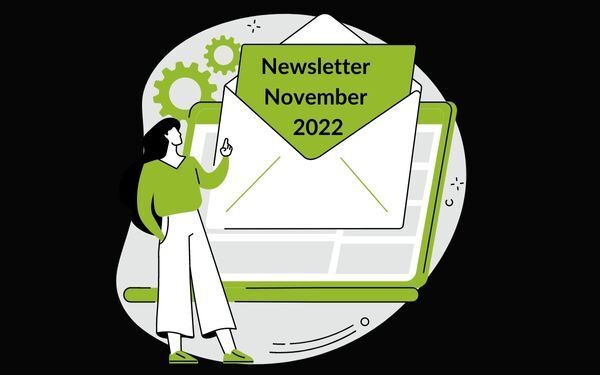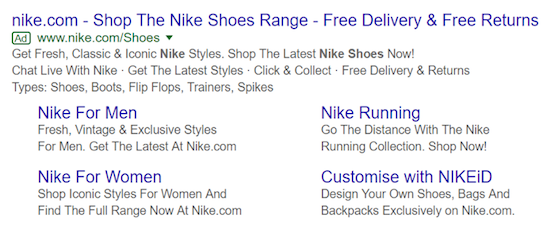PPC: A busy person's guide
Pay Per Click: All you need to know
What is Pay Per Click?
Pay Per Click, also known as PPC for short, is a tool that allows people to advertise to other people searching for something specific on a search engine like Google or Bing. For example, if we were a jeweller, we’d be able to advertise to people searching for things like ‘Rolex watches’ on Google.
As the name suggests, you pay per click for any user you that clicks on your advert. So, if you have an advert that targets someone looking for Rolex watches, and they click on your ad – you’ll pay for that click. This can range from as little as a few pence through to tens of pounds.
With PPC, you can also choose how you advertise. You can write simple text ads like this:
Fig 1.1 Nike text advert. Source: Google
Or, you can advertise on specific publications that your target audience might read. This is known as the Display Network on Google’s PPC platform – AdWords. In the image below (Fig 1.2) you can see that TheBanker magazine has paid to display an advert in the Financial Times.
Fig 1.2 The Banker advert. Source: Financial Times
How do I get started?
If you’re thinking about finding out more about PPC, you need to get an account with the two leading providers – Google AdWords and Bing Ads . Yes, Google is the market leader, but Bing takes up approximately 20% of the market , so you should be on both if you don’t want to miss out.
The next step is to think about who you want to target with your adverts. In the watch example we gave earlier, you might want to target people looking specifically for Rolex watches. But how do you find out how many people are searching for Rolex watches? This is what’s known as keyword research.
Google AdWords has a free ‘ Keyword Planner’ (Bing’s equivalent is the KeywordPlanner Tool ) that helps give you an idea of how many people are searching for specific things (you’ll need to set up your AdWords account first before you can use this).
You can even customise the information you get by changing the location. For example, you could change ‘United Kingdom’ in Fig 2.1 below to a specific location like ‘Exeter’ to see how many people search for that term there.
Fig 2.1 Google AdWords Keyword Planner. Source: Google AdWords
For Rolex watches, you can see that it gets between 10,000 and 100,000 searches per month in the UK, according to Google’s data:
Fig 2.2 Monthly searches for ‘rolex watch’. Source: GoogleAdWords
A more localised search, like 'rolex watch exeter' would produce fewer results.
So, what next then?
Keyword research is a lengthy process. If done properly, you should spend quality time building lists of appropriate keywords to use to advertise to your potential customers.
You can add lists of keywords within the Google AdWords andBing platforms to build a picture of what keywords you should target. You can use tools such as Moz to help you do keyword research.
Don’t have the time? Why not get in touch and see if we can help ?
Is there any skill involved?
AdWords has recently launched AdWords Express , a much simpler way to create adverts. But be warned – without much training, it is easy to burn through your money and waste budget on keywords that aren’t relevant to what you’re looking for.
PPC platforms like Google Ads and Bing Ads are notorious for encouraging you to spend more on their platform. It is worth attending a course, like this one with Econsultancy , to truly understand how the platforms work.
Popular keywords, such as ‘Rolex watches’ can also be very expensive to bid on, especially at peak times such as Christmas. You can end up in what’s known as a bidding war, where lots of businesses are trying to bid on the same keyword, which in turn pushes up the price. There is skill involved to find alternative keywords that will get you the same traffic for less money.
Managing your adverts
As mentioned above, good keyword research is an important part of successful PPC advertising. With PPC clients, we undertake a review of their PPC accounts – sometimes the keywords people bid on are too broad for their niche. For example, a dog food company may bid on keywords such as ‘dog’. People searching for the word ‘dog’ are not necessarily looking for dog food.This can lead to wasted clicks.
Managing the mathematical side can also be challenging too.Measuring your Return OnInvestment (ROI) is important to make sure you don’t spend more than you need to.
If you’re interested in PPC but don’t want to leave it to chance, why not get in touch with Simon , our website and digital marketing consultant in Exeter. QuayClick are an Exeter web design agency specialising in websites, SEO, PPC and copywriting.




QUICK LINKS
QC Newsletter sign-up
We will get back to you as soon as possible.
Please try again later.
All Rights Reserved | QuayClick Marketing Ltd
We’re a website design and digital marketing agency based in Exeter. We help businesses grow online and have over 20 years of experience in Web Design. We offer several inbound strategies, including paid search and SEO. In addition, our content team can help with copywriting and email campaigns.













